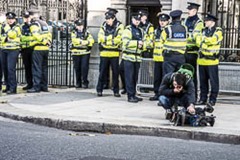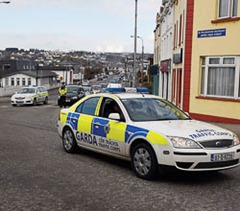Towards a Garda authority
 Peter Cheney examines the proposals for an independent policing authority – the first of its kind in the history of the State.
Peter Cheney examines the proposals for an independent policing authority – the first of its kind in the history of the State.
The Oireachtas is preparing to consider the Government’s proposals for an independent policing authority. A Bill is expected in the new year and will result in the most significant change to the oversight of policing since the foundation of the State.
The Garda Síochána Act 1924 stated that the force would be under the “general direction and control” of a Commissioner who would, in turn, be appointed by the Government. That model continued with relatively little change until 2005 when two additional structures were established:
• the Garda Síochána Ombudsman Commission (GSOC) to deal with complaints about policing; and
• the Garda Síochána Inspectorate to inspect the operation and administration of the service.
At that time, and subsequently, Fianna Fáil and Fine Gael rejected the concept of a police authority. Then Justice Minister Alan Shatter explained the Government view in a Dáil debate last year i.e. the Commissioner is already accountable to the Minister and An Garda Síochána is a security, intelligence and border control service as well as a police service. On the last point, he emphasised: “I find it hard to imagine circumstances where control of such critical national functions could be transferred to an unelected, unaccountable body.”
Labour, meanwhile, had a longstanding commitment to setting up such an authority but was unable to secure a commitment on this in the Programme for Government. The Garda tapes and penalty points revelations earlier this year prompted a sudden change in policy with ministers agreeing to establish an ‘independent policing authority’.
Proposals
The Government initially announced that the authority would be in place by the end of this calendar year – a deadline which will now be missed as full legislation has not yet been published. During a consultation exercise in April and May, the Department of Justice and Equality asked for views on:
• the functions and responsibilities of an authority;
• its appointment and membership;
• its relationship with the Government and the Oireachtas; and
• the implications for GSOC and the Garda Síochána Inspectorate.
Labour’s policy paper cited the examples of the Northern Ireland Policing Board (established in 2001) and the Scottish Police Authority which was set up last year. A new authority would “promote standards of excellence” and ensure that services were delivered “within a culture of transparency and accountability.”
The party noted that local joint policing committees have existed since 2006. These are chaired by a councillor and include other councillors, gardaí, TDs and community and voluntary sector representatives.
Under Labour’s plan, the authority would take on the Garda Inspectorate’s advisory and oversight role, oversee the policing budget, appoint senior officers and hold them to account, and provide the supporting infrastructure for investigations (e.g. IT systems and forensics).
The authority would have 13 members and could include representatives of the department, the joint policing committees and the Northern Ireland Policing Board (by invitation).
Fianna Fáil supports the establishment of the policing authority and will be bringing forward amendments to strengthen the legislation. The party sees this move as “an historic opportunity to create a world class policing service.”
Sinn Féin’s proposals draw strongly on the northern model and suggest an all-encompassing criminal justice inspectorate. The party has three members on the Policing Board in the North: Gerry Kelly, Caitríona Ruane and Pat Sheehan.
Mr Justice Fennelly’s inquiry is currently investigating the recording of telephone calls at Garda stations and the subsequent resignation of Garda Commissioner Martin Callinan.
The inquiry is due to report to the Government by 31 December.
A separate – and much shorter – inquiry by Judge John Cooke looked at alleged unlawful Garda surveillance of GSOC. His report rejected the allegations but, as a response, Minister Frances Fitzgerald presented legislation to strengthen the Garda Inspectorate and GSOC.
When enacted, the Garda Síochána (Amendment) (No.3) Bill will extend GSOC’s remit to cover the Commissioner’s office, allow it to investigate suspected criminal behaviour, and require gardaí to provide information as soon as practicably possible. It would also allow the Garda Inspectorate to work on its own initiative i.e. without prior approval from the Minister. A general scheme for the next Garda Síochána (Amendment) Bill explains that the policing authority will hold the Commissioner to account in relation to all policing services. The Commissioner will report to the Minister on national security issues; the Minister will have the sole discretion to decide whether an issue is a policing or national security matter.
The Garda National Immigration Bureau will be accountable to the authority for its policing work but will continue to act on the Minister’s behalf under the Immigration Acts.
The authority will comprise a Chair and eight other members selected by open competition, appointed by the Government and formally approved by both Houses of the Oireachtas.
Once established, it will take on responsibility (from the Minister) for approving the three-year Garda strategy statement and annual policing plan.
The authority will also draw up a formal code of ethics. Meetings in public would take place at least quarterly and the authority would answer to the Oireachtas via the committee system.
Appointments at superintendent level and above will be made by the authority except for the Commissioner and Deputy Commissioner – still government appointments but nominated by the authority. The Government named Josephine Feehily, the outgoing Chair of the Revenue Commissioners, as the authority’s Chairperson-designate. The appointment of Nóirin O’Sullivan as Commissioner is seen as a key step in moving the organisation forward. Minister Fitzgerald commented that O’Sullivan’s “experience and proven leadership capacity” made her “exceptionally well placed to deliver on this programme of reform and modernisation.”

